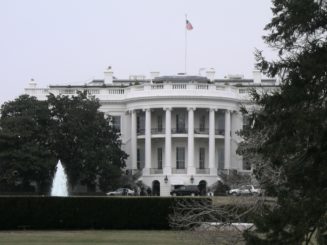
Do conservatives own the politics of faith?
Eighty-one percent of white Evangelicals voted for Donald Trump, as did majorities of Protestants and Catholics. A recent survey indicates that support is holding steady. These numbers reflect a reality the Left seems unwilling to challenge. Is it a foregone conclusion that people of faith belong in the conservative tent, particularly the Republican party? There are people of faith, including me, that stand outside that tent. Moreover, ceding crucial ground to religious conservatives leaves the Left unable to meaningfully engage with major forces on the Right.
Consider the White House’s fiscal 2018 budget proposal. Among its many proposals, it seeks to cut $10.6 billion in federal education initiatives designed to improve equity. This is because Secretary of Education Betsy DeVos views school choice as a policy that will “advance God’s Kingdom,” leading to “greater Kingdom gain.” DeVos’ faith in Jesus Christ is rivaled by her faith in Adam Smith: she’s compared choosing a school for a child to deciding between Uber, Lyft, or a taxi.
The unholy alliance of Christianity and conservative politics is deeply rooted, and well-documented. Kevin Kruse’s One Nation Under God argued that the invention of a “Christian nation” first began when corporations bankrolled conservative clergymen to attack the New Deal as “pagan statism.” Further, Dagmar Herzog’s Sex in Crisis exposed how the Christian Right hijacked and politicized sexuality to further a conservative agenda. During the 2016 presidential campaign, the spirit of the modern Christian Right could be encapsulated in the spectacle of Catholic Republicans disagreeing with Pope Francis on the need to fight poverty and climate change: “On moral issues, he speaks with incredible authority,” Marco Rubio said of the pope. “He’s done so consistently on the value of life, on the sanctity of life, on the importance of marriage and on the family. [But] on economic issues, the pope is a person.” In other words, morality should never get in the way of profit.
The influential theologian John Piper said something similar when asked to respond to the rise of Bernie Sanders: “Socialism borrows the compassionate aims of Christianity in meeting people’s needs while rejecting the Christian expectation that this compassion not be coerced or forced.” Like many other Christian leaders on the Right, Piper blends the rugged individualism of the free market with the Biblical notion of free will. Naturally, Piper ignores how the free market forces all to participate in economic exploitation and state-sponsored violence. Another leader on the Christian Right, Franklin Graham, echoed this early in 2016: “Our nation has become secular. Secularism and communism, it isn’t really any different. They’re both godless.” Perhaps most notably, Donald Trump’s clumsy attempts to court Evangelicals on the campaign trail underscores the state of American Christianity as practically indistinguishable from American Conservatism.
An exhausting array of ills are being advanced through the corridors of power, insulated from broader public outrage often because they are clothed in religious rhetoric.
Now, an exhausting array of ills are being advanced through the corridors of power, insulated from broader public outrage often because they are clothed in religious rhetoric. It is not enough to fight these forces with rational argument, as Brexit’s Remain faction learned the hard way when doubling down on economics. We have everything to lose when people of faith leave unanswered the questions raised by a bastardized version of what they hold dear. Beyond marshaling facts and organizing allies, we need to challenge the Right on a largely uncontested front: the politics of faith. This is hardly contending that the pot needs to be as black as the kettle. Engaging faith traditions where they stand means accepting the messy humanity within both the Left and the Right, and tackling it all in earnest. The kerfuffle over pro-life groups at the Women’s March speaks to something of a failure on the Left to make room at the table for different allies. It is worth remembering the role faith has played in advancing progressive causes.
Frederick Douglass’ scathing fury over slavery came not merely from personal experience, but also from a place of faith. His faith enabled him to indict a nation convinced of its virtue, thundering in 1852: “The existence of slavery in this country brands your republicanism as a sham, your humanity as a base pretense, and your Christianity as a lie.” Further, many abolitionists were driven by religious conviction. Martin Luther King, Jr.’s faith, too, shaped his actions, informed his speeches, lent weight to Amos 5:24’s “we will not be satisfied until justice rolls down like waters, and righteousness like a mighty stream.” King’s faith led him to sharper critiques of American capitalism and American empire, ultimately moving him to say: “One day we must ask the question, ‘Why are there forty million poor people in America?’ … When you ask that question, you begin to question the capitalistic economy.” King, by the end of his life, was a socialist. In the present, this fusion of faith and politics helped turn the tide on gay rights. As one example, look at the video of an Irish Catholic couple urging marriage equality. Many people of faith in the United States had similar conversations with their friends, families, communities, making public their personal beliefs—culminating with the Obergefell decision in 2015.
Everything is politics. Faith, too, is politics. Hillary Clinton was particularly articulate about her Methodist faith during the 2016 presidential campaign, but hers was a faith that didn’t seek to shake the foundations of the society in which we live. The facts are relatively easy to deploy against the cruel and exploitative policies of the Right. But to dismantle the ties that bind capitalism with conservatism, it means going beyond attacking one and ignoring the other. It means denouncing the hypocrisies of the Christian Right the way Jesus overturned tables in the temple, the way he confronted the abuse of religious power: “You snakes! You brood of vipers!” Bernie Sanders expressed a faith committed to social justice in a way the Left and people of faith could get behind: “The truth is, at some level, when you hurt, when your children hurt, I hurt. And when my kids hurt, you hurt.”
The stated mission and philosophy of the Student Statesmanship Institute, a “Jesus Camp” type organization devoted to funneling Christian fundamentalists into American politics, is emblematic of the moral myopia within the Christian Right: “Human life is sacred and must be protected, particularly the most vulnerable in our society—the unborn, disabled and elderly.” Absent is the preponderance of the Bible’s injunctions to care for the poor, the widow, the orphan, the stranger. And never mind how fundamentalist pro-life policies will accomplish exactly the opposite. The Christian Right’s Hydra of an agenda cannot be overcome by cutting off one destructive policy at a time, not without first striking at its moral center.
The Talmud contains a passage that could well be the lodestar for a politics of faith on the Left:
God is always on the side of the persecuted. If a just man is persecuted by a wicked one, God is with the persecuted just man. If a wicked man is persecuted by a wicked man, God is with the persecuted. And if a wicked man is persecuted by a just man, God is on the side of the persecuted wicked man against the persecutor.
For many people of faith, the Left’s struggle for social justice is aligned with the call to take the side of the persecuted. Whatever the Christian Right is advancing, it is not God’s kingdom. And we who see this truth need to take the fight to them.
Ethan Tan is a Christian, a Democratic Socialist, and a graduate from the School of Social Policy & Practice at the University of Pennsylvania.


